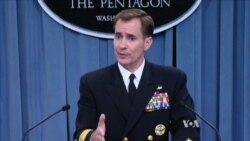U.S. Defense Secretary Chuck Hagel is taking a hard look at assessments by special forces teams in Iraq, focusing on the state of the Iraqi security forces and the threat posed by Sunni militants. Defense officials say despite a complex and fluid situation on the ground, there will be no rush to move forward with additional help.
In Baghdad, there are fears that scenes of violence, like the aftermath of a recent deadly car bombing, are about to become the new normal.
In the north, attacks by the Islamic State of Iraq and the Levant have Shi’ites running for their lives.
"Some of the people were buried under the rubble of their houses, while others were shot dead in the street," said Abbas Ali, a Shi’ite Turkmen.
But for all the tales of horror, Pentagon officials say they are seeing some progress - Iraqi forces moving to retake the city of Tikrit and recapturing and holding the country's largest oil refinery.
“I don’t know that I’m prepared here to qualify and say absolutely the momentum’s been broken, but certainly the Iraqis are fighting back and ultimately, and we said this at the very outset, this has got to be their fight,” said Pentagon Spokesman Rear Admiral John Kirby.
How much the U.S. will help in that fight remains a question.
Defense Secretary Chuck Hagel and other senior leaders are just now looking over the initial reports by U.S. teams sent to Iraq to assess the situation. There also is no timeline for how long the review will take and no guarantee they will recommend anything more than the surveillance flights, guns and ammunition already being provided.
“The long term solution for Iraq security is a stable inclusive political process,” said Kirby.
In the meantime, Iraq has been turning to Russia and Iran for help, like fighter jets.
Experts testifying before Congress Wednesday, like retired Army General Jack Keane, see that as a problem.
“The fact of the matter is Iran has an influence here. And I think as we sit here and not do much of anything, that influence will grow in stature,” said Keane.
Former U.S. Ambassador to Iraq James Jeffrey told lawmakers Washington needs to flex its military muscle.
“Limited military force would be a leverage factor, a multiplier of our influence because right now it will make all the difference and people are wondering whether we’re going to do it,” said Jeffrey.
In addition to teams on the ground, the U.S. has an aircraft carrier and destroyers in the Persian Gulf. But for now they are just watching carefully while Shi’ite militias take up arms to defend shrines and towns from a possible ISIL advance.





